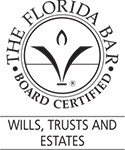Irrevocable trusts in Palm City, FL, are just as they sound – irrevocable. Once the terms of the trust have been set, it’s very difficult and sometimes impossible to alter them without court intervention. The disadvantages of irrevocable trusts must be carefully weighed against your objectives. While irrevocable trusts offer many benefits, the inability to change the terms and beneficiaries of the trust can be unappealing.
Schedule a Complimentary Discovery Call
Table of Contents
![couple discussing disadvantages of irrevocable trusts in Palm City | Florida Estate Planning Lawyer]() Understanding Basic Trusts
Understanding Basic Trusts
Trusts consist of at least one grantor, one trustee, and one beneficiary. After the grantor creates the trust, it must be ‘funded.’ The trust is just an empty vessel unless assets are transferred to it.
Generally, trusts can be either revocable or irrevocable. There are advantages and disadvantages to each kind of trust. In this article, we will take a look at three disadvantages of irrevocable trusts.
The Disadvantages of Irrevocable Trusts Start With Loss of Control
When assets are transferred to a trust, the grantor no longer owns the asset – the trust does. However, the grantor of a revocable trust can directly control the assets.
Assets transferred to irrevocable trusts are no longer controlled by the grantor. More importantly, the trust assets are no longer part of the grantor’s taxable estate. However, the benefits of tax reduction may not be enough to balance the loss of control, and with a federal estate tax exemption in excess of $11 million per person, many people will not benefit at all, from an estate tax perspective, from the use of an irrevocable trust.
Complexity of Irrevocable Trusts in Palm City
An irrevocable trust may be more complicated to establish than a revocable trust, making complexity one of the disadvantages of irrevocable trusts. Income tax, gift tax, asset protection, and estate tax issues must be thoroughly considered. Due to the complexity, the upfront costs of establishing an irrevocable trust will likely be higher.
Adding to the complexity is the number of irrevocable trusts available. Each has its own purpose:
- Dynasty Trust – provides income to family members for generations.
- Grantor-Retained Annuity Trust (GRAT) – may reduce taxes on gifts to family members.
- Irrevocable Life Insurance Trust – usually manages proceeds of a life insurance policy.
- Medicaid Asset Protection Trust – provides much-needed support while preserving the beneficiary’s Medicaid eligibility.
The characteristic all irrevocable trusts share is the difficulty in or inability to change the terms of the trust.
Why Should I Hesitate Before Setting Up an Irrevocable Trust?
When considering whether to use an irrevocable trust, keep the following in mind:
- The settlor, the person who creates the trust, does lose control over the assets transferred to the trust.
- Transferring all your assets to an irrevocable trust could leave you with cash flow problems.
- The trust may not accomplish your goals. For example, Maura may want her irrevocable trust to help with future Medicaid eligibility. If laws change after she established the trust, she may find the trust to be more of a disability than an asset.
- Other estate planning options may provide asset protection without being irrevocable.
Like any other estate planning tool, it’s important to know how the advantages and disadvantages relate to your circumstances.
Is an Irrevocable Trust Right for You?
Maura and her husband decided to use several trusts – including one irrevocable trust – to meet their estate planning needs. Fortunately, they consulted with an attorney who knew the consequences of using the wrong trust.
Don’t Take a Chance With Something This Important
Do you question the need for attorney guidance with so many online resources? Because laws and regulations are complex, and because every person has a lot at risk, more people than ever are seeking professional guidance from an experienced, knowledgeable source. That helps explain the rapid growth of our firm.
Schedule a Complimentary Discovery Call
Whether you happened upon this website by accident or are one of the many referrals we receive from a nearly 15-year collection of satisfied clients, our Palm City estate planning attorney can provide customized estate planning guidance for you from our office in Palm City or Stuart, FL. Click the button above to schedule a vision meeting or call us at (772) 266-5108 now!

 Understanding Basic Trusts
Understanding Basic Trusts







